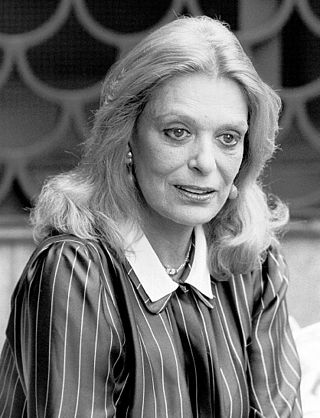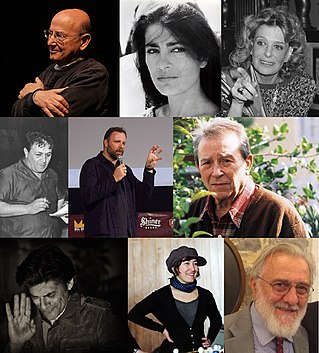Related Research Articles

Theodoros "Theo" Angelopoulos was a Greek filmmaker, screenwriter and film producer. He dominated the Greek art film industry from 1975 on, and Angelopoulos was one of the most influential and widely respected filmmakers in the world. He started making films in 1967. In the 1970s he made a series of political films about modern Greece.

Maria Amalia "Melina" Mercouri was a Greek actress, singer, activist, and politician. She came from a political family that was prominent over multiple generations. She received an Academy Award nomination and won a Cannes Film Festival Best Actress Award for her performance in the film Never on Sunday (1960). Mercouri was also nominated for one Tony Award, three Golden Globes and two BAFTA Awards in her acting career. In 1987 she was awarded a special prize in the first edition of the Europe Theatre Prize.

Aliki Stamatina Vougiouklaki was a Greek cinema and theater actress, singer and theatrical producer. She is one of the most popular actresses in Greece, and was given the title of the National Star of Greece. Theatrically, she mostly starred in renditions of widely known Broadway musicals as well as multiple Greek tragedy plays. Vougiouklaki died in 1996 at the age of 62, just three months after being diagnosed with pancreatic cancer.

The cinema of Greece has a long and rich history. Though hampered at times by war or political instability, the Greek film industry dominates the domestic market and has experienced international success. Characteristics of Greek cinema include a dynamic plot, strong character development and erotic themes. Two Greek films, Missing (1982) and Eternity and a Day (1998), have won the Palme d'Or at the Cannes Film Festival. Five Greek films have received nominations for the Academy Award for Best Foreign Language Film.

Thanasis Veggos was a Greek actor and director born in Neo Faliro, Piraeus. He performed in around 130 films, predominantly comedies in the 1950s, 1960s, and 1970s, starring in more than 50 among them. He is considered one of the best Greek comedy actors of all time. His famous comedic catchphrase was Καλέ μου άνθρωπε.

The Thessaloniki International Film Festival (TIFF), organized by the cultural institution of the same name under the auspices of the Greek Ministry of Culture, is held every November in Thessaloniki.TIFF features international competition sections, and its program includes tributes to major filmmakers and national cinemas, as well as sidebar events such as masterclasses, exhibitions, live concerts and workshops. In addition to TIFF, its parent cultural institution holds the annual Thessaloniki Documentary Festival (TDF) in March.
Voula Zouboulaki was an Egyptian-born Greek actress. She was the wife of actor Dimitris Myrat. She attended the Dramatic School of the National Theatre, the School of the National Odeon and the Law School of the University of Athens.

The Thessaloniki Documentary Festival (TDF) is an international documentary festival held every March in Thessaloniki, Greece. TDF, founded in 1999, features competition sections and ranks among the world's leading documentary festivals. Since 2018, TDF is one of the 28 festivals included in the American Academy of Motion Picture, Arts and Sciences Documentary Feature Qualifying Festival List. TDF is organized by the Thessaloniki Film Festival cultural institution, which further organizes the annual Thessaloniki International Film Festival, held every November. French producer Elise Jalladeu is TDF's general director; film critic Orestes Andreadakis serves as its director.

The David di Donatello Awards, named after Donatello's David, a symbolic statue of the Italian Renaissance, are film awards given out each year by the Accademia del Cinema Italiano. There are 26 award categories, as of 2023.

Pula Film Festival is an annual Croatian film festival, established in 1954. It is held in a Roman amphitheater known as the Pula Arena. Pula Film Festival is the oldest Croatian film festival and is usually held in the summer, in July or August.
Peppermint is a 1999 Greek film directed by Costas Kapakas. It was Greece's submission to the 73rd Academy Awards for the Academy Award for Best Foreign Language Film, but was not accepted as a nominee.
Angeliki Antoniou is a Greek film director, screenwriter and producer. She studied architecture in Greece and film direction at the German Film and Television Academy in Berlin. She works as scriptwriter and director in Greece and in Germany. In 2006 she taught film direction at the Film School of University in Thessaloniki. She lives in Athens and Berlin. She has directed feature films and documentaries which have been screened and awarded in prestigious international festivals and distributed world-wide.
Listapad, also known as Minsk International Film Festival (MIFF) or Minsk International Film Festival Listapad, is an annual film festival which takes place in November in Minsk, Belarus. It is the largest such festival in Belarus.
The Thessaloniki Song Festival, officially the Greek Song Festival was a Greek song festival hosted between 1959–1997 and 2005–2008. The host city of the event was initially Athens (1959–1961) but the contest was later moved to Thessaloniki, from which it got its name.
Hellenic Film Academy Awards or Hellenic Iris Awards are a set of awards given annually by the Hellenic Film Academy for excellence of cinematic achievements in Greek cinema, replacing the abolished Greek State Film Awards. On May 3, 2010 the first awards ceremony was presented at the Athens Concert Hall. Since 2016 the awards renamed to Iris Awards.
The Greek State Film Awards was a part of Thessaloniki International Film Festival concerning exclusively Greek movies. It was one of the most important events in Greek cinema, from its institution in 1992 until 2008.
Dinos Katsouridis was a Greek Cypriot film director, cinematographer and editor. He had worked in a lot of Greek film sometimes as director, sometimes as film editor and sometimes as cinematographer as well as writer. He has won film awards about all the categories of these works

Yannis Economides, is a Greek Cypriot screenwriter and filmmaker, who is considered to be one of the leading creators of modern Greek cinema. His films explore themes of emotional and physical violence, alongside the collapse of petty-bourgeois society and the pathologies of today's families. They are characterized by their extreme use of profanity and depiction of graphic violence.
The Thessaloniki Film Festival is a Thessaloniki-based cultural institution focusing on cinema. The Institution organizes the Thessaloniki International Film Festival every November and the Thessaloniki Documentary Festival every March, while its year-long activity includes the Thessaloniki Cinema Museum and the Thessaloniki Cinemateque, as well as screenings and special tributes held throughout the year, and educational programs. The Thessaloniki Film Festival is the largest film institution in Greece., its activity attracting more than 300.000 visitors yearly.
Meredyth Herold is a Greek film and television actress best known for Singapore Sling (1990), To spiti stin exohi (1994) and To koritsi me tis valitses (1997).
References
- ↑ "Thessaloniki Film festival". archive.in.gr. Retrieved 8 March 2015.
- ↑ "Profile". filmfestival.gr. Retrieved 8 March 2015.
- 1 2 3 4 5 6 "awards 1962". Thessaloniki Film Festival. Retrieved 8 March 2015.
- 1 2 3 4 5 6 "awards 1963". Thessaloniki Film Festival. Retrieved 8 March 2015.
- 1 2 3 4 5 6 7 "awards 1964". Thessaloniki Film Festival. Retrieved 8 March 2015.
- 1 2 3 4 5 6 7 "awards 1965". Thessaloniki Film Festival. Retrieved 8 March 2015.
- 1 2 3 4 5 6 "awards 1966". Thessaloniki Film Festival. Retrieved 8 March 2015.
- 1 2 3 4 5 6 7 "awards 1967". Thessaloniki Film Festival. Retrieved 8 March 2015.
- 1 2 3 4 5 6 7 8 9 10 "awards 1968". Thessaloniki Film Festival. Retrieved 8 March 2015.
- 1 2 3 4 5 6 7 8 "awards 1969". Thessaloniki Film Festival. Retrieved 8 March 2015.
- 1 2 3 4 5 6 "awards 1970". Thessaloniki Film Festival. Retrieved 8 March 2015.
- 1 2 3 4 5 6 7 8 9 "awards 1971". Thessaloniki Film Festival. Retrieved 8 March 2015.
- 1 2 3 4 5 6 7 8 "awards 1972". Thessaloniki Film Festival. Retrieved 8 March 2015.
- 1 2 3 4 5 6 7 8 9 "awards 1973". Thessaloniki Film Festival. Retrieved 8 March 2015.
- 1 2 3 4 5 "awards 1974". Thessaloniki Film Festival. Retrieved 8 March 2015.
- 1 2 3 4 5 6 7 "awards 1975". Thessaloniki Film Festival. Retrieved 8 March 2015.
- 1 2 3 4 "awards 1976". Thessaloniki Film Festival. Retrieved 8 March 2015.
- 1 2 3 4 5 "awards 1977". Thessaloniki Film Festival. Retrieved 8 March 2015.
- 1 2 3 4 5 6 7 8 9 10 "awards 1978". Thessaloniki Film Festival. Retrieved 8 March 2015.
- 1 2 3 4 5 6 7 8 9 "awards 1979". Thessaloniki Film Festival. Retrieved 8 March 2015.
- 1 2 3 4 5 6 7 8 "awards 1980". Thessaloniki Film Festival. Retrieved 8 March 2015.
- 1 2 3 4 5 6 7 8 9 "awards 1981". Thessaloniki Film Festival. Retrieved 8 March 2015.
- 1 2 3 4 5 6 "awards 1982". Thessaloniki Film Festival. Retrieved 8 March 2015.
- 1 2 3 4 5 6 7 8 9 10 11 "awards 1983". Thessaloniki Film Festival. Retrieved 8 March 2015.
- 1 2 3 4 5 6 7 8 9 "awards 1984". Thessaloniki Film Festival. Retrieved 8 March 2015.
- 1 2 3 4 5 6 7 8 9 10 11 12 13 "awards 1985". Thessaloniki Film Festival. Retrieved 8 March 2015.
- 1 2 3 4 5 6 7 8 9 10 11 12 13 "awards 1986". Thessaloniki Film Festival. Retrieved 8 March 2015.
- 1 2 3 4 5 6 7 8 9 10 11 12 13 14 15 "awards 1987". Thessaloniki Film Festival. Retrieved 8 March 2015.
- 1 2 3 4 5 6 7 8 9 10 "awards 1988". Thessaloniki Film Festival. Retrieved 8 March 2015.
- 1 2 3 4 5 6 7 8 9 10 11 12 13 14 "awards 1990". Thessaloniki Film Festival. Retrieved 8 March 2015.
- 1 2 3 4 5 6 7 8 "awards 1960". Thessaloniki Film Festival. Retrieved 8 March 2015.
- 1 2 3 4 5 6 7 "awards 1961". Thessaloniki Film Festival. Retrieved 8 March 2015.
- 1 2 3 4 5 6 7 8 9 "awards 1989". Thessaloniki Film Festival. Retrieved 8 March 2015.
- 1 2 3 4 5 6 7 "awards 1991". Thessaloniki Film Festival. Retrieved 8 March 2015.